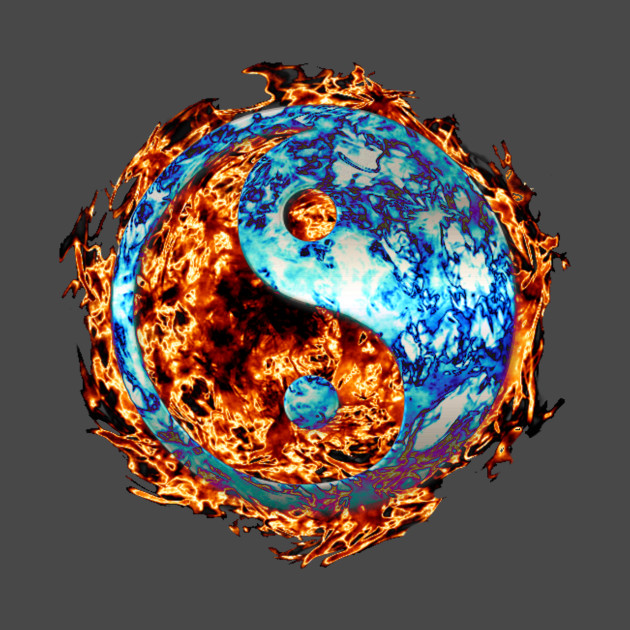We seem to be living in times in which it’s hard to find answers. How does the magical practitioner use the fruits of their training and study to hold a position of both wisdom and radical uncertainty? How do we explore the meaning of our collective COVID-19 related trauma while at the same time acknowledging that meaning is elusive and potentially risks over-simplification? Many of us feel caught between the competing pulls of hope and despair, science and superstition, and claustrophobia and agoraphobia.
Ironically I became interested in the occult precisely because it tried to grapple with complexity and dynamic tension. In contrast to the mono-answers of faith, here was a messy hodgepodge of ideas called the Western Mystery Tradition that tried to hold in dynamic tension the poles of light and dark, male and female, and mercy and severity. While we may long for a simpler solution (especially at times of distress), I personally have become increasingly interested in how we magicians of varying stripes manage dynamic tension.
While the history of Western magic is littered with systems that make use of polarity, they often project such binaries outwards onto the form of divine versions of the God and Goddess. In contrast to this externalising approach, lately I have been reflecting on how we negotiate our internal struggles. Forgive me if what follows sounds a tad academic; I plan to write a sequel to this in post in which ‘Tense Magicians get Creative’.

Hegel and Synthesis
It’s hard to think about binaries and their tension at a conceptual level without at least a nod to the concept of the Hegelian dialectic. Hegel (1770–1831), as an expression of the philosophy of Idealism, believed that a dynamic process was at work at both a micro and macro level, in which ideas and their polar opposites were in a process of reconciliation, synthesis or sublimation. His ideas were then popularized by others in the formula: Thesis, Antithesis, Synthesis i.e. every idea (a thesis) will have its opposite (its antithesis) and that this polarity will eventually evolve a reconciling third principle that at once retains and transforms the qualities of the original idea (the synthesis).

I first encountered these ideas as a fledgling psychotherapist 20 years ago when I undertook a training in Dialectical Behaviour Therapy that was aimed at supporting people with intense difficulties in identifying and regulating their emotions. For such clients a primary dilemma is observed in which they are trying to synthesise a balancing position between either feeling flooded by emotion or dismissing their emotions and fleeing to a cold over-reliance on reason. The synthesis in this case is called “Wise-Mind” and aims at helping emotions and reason to dialogue and inform each other.
Such dynamics can provide interesting scaffolding for our own initiatory processes. When we feel ourselves strongly drawn to a theme or concept, our exploration may eventually lead us to its apparent opposite. For example an exploration of indulgence may also include discovering a greater understanding of abstinence. In our exploration of such apparent polarities we may then synthesise a mediating position that brings about a more profound perception of the whole. Arguably such mediation and balancing is one of the key tasks of the mature magician.
While there is much to be recommended in a deeper exploration of how the alchemy of dialectical processes may be at work at both a subjective and objective level, critics of this dynamic often question the neatness of its balancing processes. Hegel in his Idealism was keen to locate an unfolding of meaning that often feels unrelated to the ennui and impermanence that most of us experience in our lives and magical exploration.
Dialogics and Dynamic Tension
In contrast to the balancing, reconciling metaphysics of dialectics, the dialogical worldview seeks to grapple with what happens if we allow a multiplicity of perspectives to co-exist without conscious attempts at reconciliation. Inspired by the fiction of Dostoevsky and the philosophical work of Bakhtin, dialogical theory and its therapeutic love-child Dialogical Self Theory explore the complex terrain of a reality where numerous voices and dimensions of self are explored, voiced and allowed to interact fluidly with each other so as to generate new relationships and tensions. This is quite heady territory, but in my initial exploration of some of its insights I felt that it potentially offered something helpful in understanding dynamic tension as gnostic-engine for initiatory change.

My hunch is that as magicians we are working with such tensions all the time and much of our spiritual work involves the exploration of them as much as it does the imagined resolution. To work deeply with the self usually involves a journey downwards into the roots of what really motivates us. However we conceptualise the realm of the unconscious, the tools of artistic creativity, dream work and more receptive meditative states are important keys for exploring this territory. Whilst part of us may want a simpler synthesis, sometimes it is the tension that generates the most interesting work.
Steve Dee
Coming up next…
Julian is leading more online ritual workshops with Treadwell’s Books.
More Deep Magic online courses are in production. Core Magical Skill and Imagination & Wellbeing (which is free) are available here.
My Magical Thing continues to enchant, entertain and inform.
The Illuminates of Thanateros and Me shares perspectives from The Magical Pact of the IOT.

“understanding dynamic tension as gnostic-engine for initiatory change” is a tantalising phrase Steve. I’m very much looking forward to part two and a discussion about this. Personally, I’m getting rather stuck in some quite stark dialectic stuffs and wondering how to work with that.